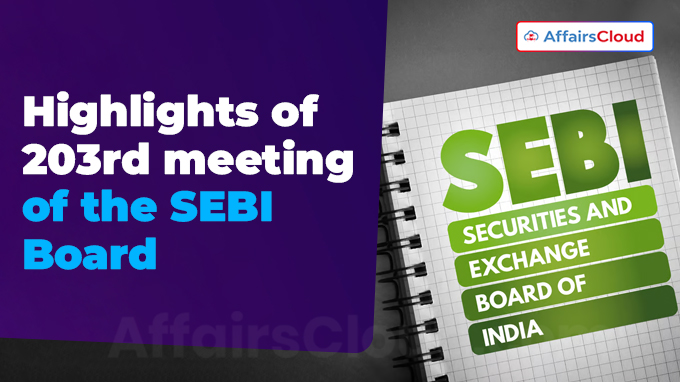 Madhabi Puri Buch, Chairman of Securities and Exchange Board of India (SEBI) chaired the 203rd meeting of the SEBI which was held in Mumbai, Maharashtra on November 25, 2023. The SEBI Board meeting announced key decisions related to NPO fundraising, regulations for index providers, AIFs operations etc.
Madhabi Puri Buch, Chairman of Securities and Exchange Board of India (SEBI) chaired the 203rd meeting of the SEBI which was held in Mumbai, Maharashtra on November 25, 2023. The SEBI Board meeting announced key decisions related to NPO fundraising, regulations for index providers, AIFs operations etc.
Key Highlights of 203rd meeting of the SEBI Board are:
i.SEBI Board introduces flexibility for Social Stock Exchange(SSE) in order to give boost to fund raising by Not for Profit Organisation (NPOs) on the SSE.
ii.SEBI reduces minimum issue size from Rs1 crore to Rs 50 Lakh for public issuance of Zero Coupon Zero Principal (ZCZP) instruments.
iii.SEBI has further approved to reduce minimum application size from Rs 2 Lakh to Rs10000 for public issuance of ZCZP by NPO on social stock exchange. It will help to expand participation of subscribers including Retail.
iv.SEBI Board approved a regulatory framework for index providers in order to introduce transparency and accountability in the functioning of the securities market.
v.SEBI approved amendments to SEBI (Real Estate Investment Trusts) Regulations, 2014.
vi. SEBI with the objective of protecting the interests of investors in Alternative Investment Funds (AIFs) approved an amendment to SEBI (Alternative Investment Funds) Regulations, 2012.
vii. SEBI plans to introduce same day (T+0) settlement by March 2024 and Instantaneous settlement 2025.
Key Changes in framework for Social Stock Exchange
During the 203rd meeting of SEBI, Board members of SEBI have unanimously approved key changes in the framework for Social Stock Exchange. Its main aim is to give a boost to fund raising by NPOs (Not for Profit Organisations) on the social stock exchange.
- SEBI has decided to decrease the minimum issue size in case of public issuance of Zero Coupon Zero Principal (ZCZP) from Rs 1 crore to Rs 50 Lakh.
- To attract wider participation of subscribers including retail. It has approved the minimum application size of public issuance of ZCZP by NPOs on Social Stock Exchange (SSE) from Rs 2 Lakh to Rs 10000.
- NPOs will be made eligible for registration on SSE under Section 10(23C) and 10(46) of the Income Tax Act (1961).
- Changing the nomenclature of “Social Auditor” with “Social Impact Assessor” to provide comfort to NPOs and convey a positive approach towards the social sector.
About Social Stock Exchange (SSE):
- It is a trading platform that allows social enterprise and non-profits to raise capital from investors that invest in social welfare programmes.
- SSE acts as a separate entity within the existing stock exchange.
- The concept of setting up a Social Stock Exchange was introduced in the Union Budget (2019).
Introduces New Framework for Small and Medium REITs
The Board approved amendments to SEBI Real Estate Investment Trusts (REIT’s) Regulations, 2014.
Objective: To create a regulatory framework for facilitation of small and medium REITs with an asset value of at least Rs50 crore vis-à-vis minimum asset value of Rs 500 crore for existing REITs.
About Real Estate Investment Trust (REIT)
- It is an entity to raise funds from investors to invest in income generating real estate properties like: residential apartments, shopping building, hotels etc.
- REITs were introduced by SEBI in 2007.
- It is mandatory for all REITs to be listed on the stock exchange.
SEBI asked Fresh AIFS to be held in Dematerialise Units
SEBI proposed amendments to SEBI Alternative Investment Funds (AIF) Regulations, 2012. Its main aim is to protect the interests of investors in Alternative Investment Funds (AIFs).
Key Points:
- Sebi mandated all the fresh investments made by an AIF after September 2024 should be held in demat form and any fresh investment made by an AIF, beyond September 2024, shall be held in dematerialised form.
- However, the existing investment made by AIFs have been exempted in cases:
i.Where an investee company has been mandated to facilitate demat of its securities.
ii.Where AIF along with other SEBI registered entities hold investment in demat form.
- The new requirement would be exempted for investment held by AIF schemes whose tenure ends within one year and schemes of an AIF that are in extended tenure and Liquidation of AIF schemes.
- Under the proposed amendment, the mandate for appointment of custodian shall now be extended to all AIFs. Earlier, it was applicable for schemes of Category III and to schemes of Category I and II AIFs with corpus more than Rs 500 crore.
About Alternative Investment Fund (AIF):
It is a special fund established to raise privately pooled investment vehicle from private entities whether Indian or foreign to invest in accordance with a defined investment policy for the benefit of its investors. These funds do not draw investment in the form of Cash or Bonds or Capital Stocks. AIFs are regulated by SEBI under SEBI (Alternative Investment Fund) Regulation, 2012.
AIFs are further categorized in three different categories:
- Category I: mainly invests in startups or any other sector which the Government considers socially and economically desirable. Examples: Venture Capital , Social Venture Fund
- Category II: includes private equity or debt funds for which the government or any other regulator provides subsidies. Examples: Real Estate, Private Equity Funds
- Category III: includes a fund which trades with a view to short term return with no time limit. Example: Hedge Funds
Note: Category I and Category II AIFs are required to have a minimum tenure of 3 years whereas for Category III AIF has no specific time limit.
Introduces Regulatory Framework for Index Providers
SEBI introduced a regulatory framework for Index Providers with the main aim of introducing transparency and accountability in governance and administration of financial regulations in the security market.
- The regulatory framework follows the IOSCO Principles for financial benchmark shall only be applicable to “Significant Indices”.
About Index Providers: are the companies which define certain rules and set benchmarks for markets. They decide which securities to include, removed, from index over time.
- Some of the major indices in India are: Nifty50 by NSE (National Stock Exchange), Sensex provided by a venture of S&P Dow Jones and BSE Lied.
SEBI to introduce same day settlement by March 2024
Madhabi Puri Buch, Chairman of SEBI announced that SEBI would soon introduce a roadmap for the same-day (T+0) settlement of trades by March 2024 which will later be followed by instantaneous settlement by 2025.
- She emphasized adopting a robust technological pathway to facilitate immediate settlement.
- Earlier, In January 2023, India had moved to T+1 settlement cycle, which means that trade-related settlements must be made in a day or 24 hours on completion of transaction.




